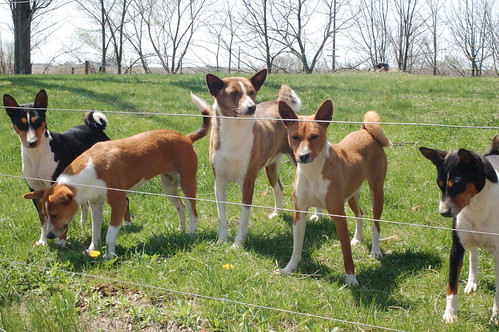The Basenji is a breed of hunting dog that was bred from stock originating in central Africa. Only in North America is the breed considered to be of the sighthound type. Most of the major kennel clubs in the English-speaking world place the breed in the Hound Group, although The American Kennel Club has proposed realigning the dog breed groups, placing the Basenji into a new sighthound group. The Fédération Cynologique Internationale places the breed in Group 5, Spitz and Primitive types, and the United Kennel Club (US) places the breed in the Sighthound & Pariah Group.
The Basenji produces an unusual yodel-like sound, due to its unusually shaped larynx. This trait also gives the Basenji the nickname "Barkless Dog." In behavior and temperament they have some traits in common with cats.
Sometimes referred to as an Egyptian or African dingo, Basenjis share many unique traits with Pariah dog types. Basenjis, like dingos and some other breeds of dog, come into estrus only once annually, as compared to other dog breeds which may have two or more breeding seasons every year.
Both dingos and Basenjis lack a distinctive odor, and both are considered relatively silent, more prone to howls, yodels, and other undulated vocalizations over the characteristic bark of modern dog breeds. While dogs that resemble the basenji in some respects are commonplace over much of Africa, the breed's original foundation stock came from the old growth forest regions of the Congo Basin, where its structure and type were fixed by adaptation to its habitat, as well as use (primarily net hunting in extremely dense old-growth forest vegetation).
Sometimes referred to as an Egyptian or African dingo, Basenjis share many unique traits with Pariah dog types. Basenjis, like dingos and some other breeds of dog, come into estrus only once annually, as compared to other dog breeds which may have two or more breeding seasons every year.
Both dingos and Basenjis lack a distinctive odor, and both are considered relatively silent, more prone to howls, yodels, and other undulated vocalizations over the characteristic bark of modern dog breeds. While dogs that resemble the basenji in some respects are commonplace over much of Africa, the breed's original foundation stock came from the old growth forest regions of the Congo Basin, where its structure and type were fixed by adaptation to its habitat, as well as use (primarily net hunting in extremely dense old-growth forest vegetation).





No comments:
Post a Comment